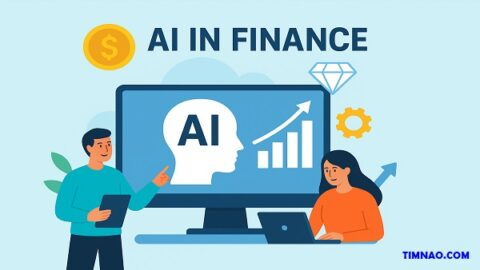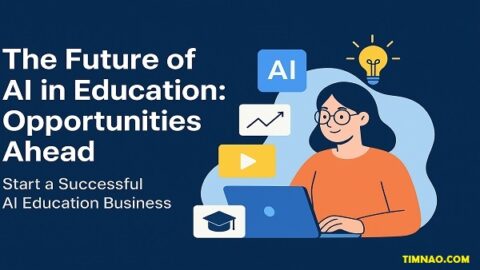Unlock Massive Wealth with AI: Why Most People Miss This Game-Changer 🚀
AI wealth creation is no longer a futuristic fantasy — it’s happening right now, and it’s transforming the way everyday people save, invest, and grow their money. From automated investing to intelligent budgeting apps, artificial intelligence is giving beginners a powerful edge in personal finance and business.
Whether you’re looking to build a nest egg, launch a side hustle, or navigate the volatile world of crypto, AI-powered finance tools can help you do it smarter, faster, and more confidently. The best part? You don’t need to be a tech expert or millionaire to get started.
In this guide, you’ll discover how to harness AI to take control of your money — even if you’re starting from zero. We’ll walk you through practical strategies, beginner-friendly tools, and the real risks (and rewards) of trusting machines with your financial future.
Ready to future-proof your finances? Let’s dive in.
📚 Table of Contents
- 🤖 What Is AI Wealth Creation and Why It Matters
- 📈 How AI Tools Are Revolutionizing Personal Finance
- 💼 Smarter Investing with AI-Driven Strategies
- 🏠 Real Estate Investing Enhanced by AI
- 🧠 Using AI to Supercharge Your Business Decisions
- 🌐 AI and the Future of Cryptocurrency Investing
- ⚖️ The Ethics and Risks You Shouldn’t Ignore
- 🔮 What’s Next: Future Trends in AI for Wealth
- ✅ Getting Started: Practical Tools and First Steps
- 🙋 FAQs: Beginner Questions About AI Wealth Creation Answered
🤖 What Is AI Wealth Creation and Why It Matters
In a world that moves faster every year, financial success no longer belongs only to those with insider connections or elite advisors. Thanks to artificial intelligence (AI), the gates to wealth creation are wide open — and smarter than ever before.
AI wealth creation refers to using intelligent systems that can learn from data, detect patterns, and make decisions to build, manage, and grow your finances. These systems don’t just analyze numbers — they adapt, predict, and personalize. From helping you track your budget to building dynamic investment portfolios, AI is becoming the ultimate financial co-pilot.
Why It’s a Game-Changer for Beginners
In the past, wealth creation required a deep understanding of complex markets, expensive advisors, or years of trial-and-error. Now, AI bridges that gap — making sophisticated financial tools accessible to everyone, even if you’re starting with $10 and a dream.
- ✅ Speed: AI processes massive amounts of data in milliseconds.
- ✅ Personalization: It adjusts strategies based on your goals and behavior.
- ✅ Automation: From saving to investing, AI removes the need for manual guesswork.
Whether you’re looking to invest smarter, launch a side hustle, or plan for retirement, AI helps eliminate decision fatigue and boosts confidence by providing data-backed guidance you can actually understand and use.
Bottom line: AI is not just a buzzword — it’s the foundation of modern-day financial empowerment. And the sooner you learn how to use it, the faster you can start building your financial future.
📈 How AI Tools Are Revolutionizing Personal Finance
Artificial intelligence isn’t just for Wall Street. It’s already reshaping how everyday people earn, spend, save, and grow their money — without needing a finance degree.
Let’s explore the most powerful ways AI is making personal finance simpler, smarter, and more inclusive.
1. Smart Budgeting You Can Stick To
Traditional budgeting is often boring, confusing, or easy to ignore. But AI-powered budgeting apps turn your spending data into a personalized financial game plan.
✅ Tools to try:
- YNAB: AI adapts your budget dynamically as your income and goals change.
- Cleo: A chatbot-style assistant that uses humor and AI to track your money, alert you to wasteful habits, and set goals.
💡 Example: Spend too much on takeout this week? Your app might nudge you with a grocery budget challenge for the next 7 days — automatically adjusting your spending limits across categories.
2. Auto-Saving Without Thinking About It
AI doesn’t just track your money — it helps you build savings without lifting a finger.
✅ Apps like Acorns and Digit analyze your spending behavior and automatically transfer small amounts into your savings or investments — rounding up purchases or skimming “safe-to-save” amounts daily.
It feels almost invisible, but adds up fast. Most users save hundreds per year without noticing.
3. Personalized Financial Coaching 24/7
AI is also redefining how we learn about money. Instead of Googling finance tips and hoping for the best, AI-powered assistants can deliver real-time, relevant financial advice right inside your app.
✅ Top tools:
- Erica by Bank of America — helps you avoid overdrafts, track subscriptions, and plan purchases.
- Qapital — uses goal-based saving rules powered by AI logic (e.g., save $5 every time you skip coffee).
4. Credit Building and Expense Analysis
Want to improve your credit score or stop overspending on late-night Amazon orders? AI tools can:
- Monitor your credit activity and offer personalized suggestions.
- Alert you to recurring subscriptions you forgot about.
- Flag risky patterns before they damage your financial health.
✅ Try Truebill (now Rocket Money) — it uses AI to analyze bills, cancel unwanted subscriptions, and negotiate lower rates for you.
Why This Matters for Beginners
Without AI, managing money used to feel like flying blind. Now, you can:
- 🧠 Get real-time advice from intelligent bots.
- 📊 Access automated insights about your financial behavior.
- 🎯 Use data-backed recommendations to adjust goals as life evolves.
Whether you earn $500 or $5,000 a month, the right AI tools help you make smarter decisions faster — and with less stress.
💼 Smarter Investing with AI-Driven Strategies
Investing used to be reserved for people with suits, spreadsheets, and stock brokers. Today, artificial intelligence is leveling the playing field — offering beginner investors the tools and insights once only available to professionals.
Whether you’re planning for retirement or just curious about stocks and ETFs, AI can help you reduce risk, optimize returns, and eliminate the guesswork.
1. Robo-Advisors: Your 24/7 Investment Assistant
Robo-advisors are automated investment platforms that use algorithms to manage your portfolio based on your financial goals, risk tolerance, and time horizon.
✅ Popular AI-powered options:
These platforms:
- Ask you a few simple questions about your goals.
- Automatically allocate your funds into a diversified portfolio (e.g., stocks, bonds, real estate funds).
- Rebalance your assets when the market changes — no human emotion involved.
💡 Beginner Tip: You can get started with as little as $100, and many robo-advisors offer fee-free options for small accounts.
2. Predictive Analytics: Seeing the Market Before It Moves
AI excels at pattern recognition. Predictive analytics uses machine learning models to forecast:
- Stock price movements
- Economic indicators (inflation, unemployment)
- Sector rotations (e.g., tech to energy)
✅ Tools to try:
- AlphaSense: AI-powered financial search engine that surfaces insights from earnings calls, filings, and news.
- Kavout: Combines fundamentals and machine learning to score and rank stocks with its “Kai Score”.
With predictive insights, you can:
- Avoid panicking during short-term volatility.
- Spot opportunities before headlines break.
- Understand “why” a certain stock is gaining traction.
3. Sentiment Analysis: Investing by Reading the Mood
What people say — especially on social media and news — often moves markets. AI-powered sentiment analysis tools scan millions of posts and articles to gauge public opinion on companies, sectors, or events.
✅ Useful platforms:
- MarketPsych: Tracks global sentiment data for asset managers and hedge funds.
- StockTwits + The TIE: Combines social chatter with analytics to help you ride the wave early.
💡 Beginner Insight: Sentiment tools can be especially helpful for swing traders or crypto investors looking for short-term shifts.
4. Risk Management: Smarter Defense for Your Portfolio
AI doesn’t just chase profits — it protects your investments.
Advanced platforms like Aladdin by BlackRock help large institutions manage trillions of dollars in risk. Today, smaller investors can tap into simplified tools that:
- Detect overexposure to risky assets
- Recommend diversification adjustments
- Predict the impact of inflation, political unrest, or industry news
Key benefit: You no longer have to “feel” your risk level — AI can measure and adjust it precisely.
5. Combining AI with Human Strategy
Just because you use AI doesn’t mean you should ditch all traditional investing wisdom. The best approach often blends:
- 📊 AI insights (fast data, emotion-free decisions)
- 🧠 Human logic (values, long-term vision, ethical preferences)
For example, you can use AI to identify undervalued stocks — and then use fundamental analysis to confirm their true value. It’s a power duo.
🏠 Real Estate Investing Enhanced by AI
Real estate has always been a reliable path to wealth. But until recently, succeeding in real estate meant deep market knowledge, long hours, and a strong network.
Now, artificial intelligence is disrupting that — making property investing more data-driven, accessible, and profitable for everyday investors.
1. Smarter Property Valuation
Traditional valuation methods rely on comparable sales (comps) and subjective appraisals. AI changes this by:
- Analyzing thousands of data points in seconds
- Including real-time market trends, renovations, school ratings, crime stats, and more
✅ Try these platforms:
- Zillow Zestimate: AI-based property value estimates that update daily
- Redfin Estimate: Uses regional trends and user-generated data for predictions
💡 Use Case: An investor can evaluate multiple properties in multiple cities in minutes — instead of days.
2. Predictive Market Insights
Want to know which cities are heating up — before the crowd catches on?
AI platforms like HouseCanary and Reonomy use machine learning to:
- Forecast price appreciation
- Predict future rental income
- Highlight neighborhoods with rising demand
This helps investors spot emerging hot zones and avoid overvalued regions heading for a downturn.
3. AI-Powered Property Discovery
If you’re looking to buy rental properties or flip homes, AI tools can surface listings based on:
- Investment potential
- Expected ROI
- Risk score based on tenant demand, taxes, and infrastructure
✅ Platforms like Roofstock and Mashvisor specialize in AI-guided discovery of income-generating properties.
4. Smart Property Management
After buying a property, the real work begins — unless you use AI.
Modern landlords use platforms like Buildium or Cozy to automate:
- Maintenance scheduling and contractor dispatch
- Tenant screening (with fraud detection and credit scoring)
- Rent pricing optimization and collection
Some tools even monitor utility usage or security alerts, helping landlords save time and avoid costly repairs.
5. Dynamic Rent Pricing
Setting the right rent price can mean the difference between high returns and high vacancy.
AI platforms like Rentometer or RealPage analyze:
- Comparable rentals in your area
- Seasonal trends
- Local economic shifts
This allows landlords to adjust prices competitively and boost rental income.
6. AI in Real Estate Development
Even developers use AI now. Tools help optimize site selection, assess zoning laws, and model population growth.
✅ Check out LandVision and Placer.ai: They help predict where future malls, condos, or co-working spaces should go — before construction begins.
Final Thoughts for Beginners
With AI, the barrier to entry in real estate is dramatically lower. You no longer need a team of agents and analysts. A beginner with access to the right tools can:
- Find better deals
- Minimize risk
- Manage properties remotely
- Grow a profitable portfolio over time
🧠 Using AI to Supercharge Your Business Decisions
Running a business today isn’t just about passion and hustle — it’s about working smarter, not just harder. That’s where AI comes in. Whether you’re a solopreneur, e-commerce seller, or managing a small team, AI can help you make faster decisions, serve customers better, and boost profits.
Let’s break down how AI tools can give your business a serious competitive edge — even if you’re just starting out.
1. AI-Powered Business Intelligence: Make Decisions Like a CEO
Imagine knowing what your competitors are doing, what your customers want next, and which product will perform best — before anyone else. That’s what AI business intelligence (BI) tools offer.
✅ Top platforms:
- Crayon: Tracks competitor strategies in real-time — from pricing changes to marketing campaigns.
- NetBase Quid: Uses AI to analyze market trends, consumer sentiment, and brand health.
💡 How it helps: You can adjust your strategy proactively rather than reactively, and spend your budget where it matters most.
2. Market Research Without the Manual Work
Before AI, market research meant spending weeks gathering surveys, reading reviews, or analyzing spreadsheets. Now, AI can:
- Analyze social media conversations
- Find gaps in the market
- Predict customer behavior
✅ Tools like AnswerThePublic and SimilarWeb give insight into what your audience is searching for — and what your competitors are ranking for.
3. Smarter Marketing with Personalized AI Campaigns
Marketing used to be a guessing game. Now, AI allows you to deliver the right message, to the right person, at the right time.
✅ Try these tools:
- HubSpot: AI segments your leads and tailors email content based on behavior.
- Jasper AI: Writes SEO-optimized content and ad copy that converts.
- Adzooma: Optimizes your Google and Facebook ads using AI.
💡 Example: Send custom emails only to people who clicked on your last promo — and automatically generate new content for each segment.
4. AI-Enhanced Customer Support That Works 24/7
AI-driven customer service tools free up your time while improving your customer’s experience.
✅ Platforms like Intercom and Zendesk AI:
- Answer FAQs instantly
- Route complex issues to the right human
- Analyze customer tone and urgency
Plus, tools like Drift qualify leads, book sales calls, and personalize responses — all from your website chatbox.
5. Smarter Financial Management
AI doesn’t just help you sell — it helps you manage your money better, too.
✅ Use cases include:
- QuickBooks AI: Automatically categorizes expenses, flags inconsistencies, and generates forecasts.
- Xero: Offers AI-driven cash flow prediction and smart invoicing.
- Float: Forecasts your cash flow months in advance using historical patterns.
6. Improve Customer Retention with Predictive Analytics
Repeat customers = long-term growth. AI can identify:
- When a customer is likely to churn
- What promotions will keep them loyal
- Which products drive repeat purchases
✅ Use tools like:
- Optimove: Predicts customer behavior and sends personalized retention campaigns.
- Retain.ai: Analyzes customer-facing interactions to improve satisfaction and reduce churn.
The Takeaway: AI can give even the smallest business the brainpower of a Fortune 500 company. Whether it’s sales, service, or operations — if you can measure it, AI can help you improve it.
🌐 AI and the Future of Cryptocurrency Investing
The world of cryptocurrency is complex, fast-moving, and often overwhelming. But here’s the good news: AI thrives in chaos. That makes it the perfect partner for anyone looking to navigate the volatile crypto landscape with more confidence and less emotion.
Let’s dive into how artificial intelligence is transforming crypto investing — and how you can start using it, even as a beginner.
1. AI Trading Bots: Your Crypto Co-Pilot
AI bots are programs that analyze market data in real-time and execute trades automatically based on pre-set conditions.
✅ Popular platforms:
These bots can:
- React in milliseconds to market swings
- Use strategies like arbitrage, scalping, or grid trading
- Eliminate emotional decision-making
💡 Beginner Tip: Start with a paper trading account to test strategies risk-free.
2. Sentiment Analysis for Crypto Market Moves
Crypto is heavily driven by public sentiment — news headlines, tweets, and Reddit posts can pump or dump coins overnight.
AI tools now monitor online chatter and deliver insights on whether a coin is riding a wave of optimism or heading into panic mode.
✅ Try:
This gives you an edge over the crowd — spotting trends as they form, not after.
3. Forecasting Crypto Prices with Machine Learning
Advanced AI models analyze:
- Trading volumes
- Whale activity
- Technical indicators (RSI, MACD, Bollinger Bands)
- Past price cycles
Platforms like CryptoForecast and Santiment use AI to generate short- and long-term predictions for Bitcoin, Ethereum, and altcoins.
💡 Pro Tip: Use these predictions as part of a larger strategy, not as gospel.
4. Discovering New Crypto Opportunities
AI doesn’t just help with known coins — it sniffs out promising new projects, too.
✅ Platforms like Token Metrics evaluate coins based on:
- Team credibility
- GitHub activity
- Market sentiment
- Technical and on-chain metrics
Use AI scoring systems to separate hype from hidden gems.
5. Enhancing Security and Risk Management
With so many scams, hacks, and rug pulls in crypto, security is critical. AI can help by:
- Flagging suspicious wallet behavior
- Detecting phishing attempts
- Monitoring dark web chatter
✅ Try:
Plus, bots like Hummingbot provide built-in risk management tools such as auto-stop-loss triggers and portfolio rebalancing.
6. Crypto Wallet Safety with AI
AI-enhanced wallets like BitGo and Ledger Live offer:
- Multi-signature verification
- Real-time fraud detection
- Behavioral biometrics for added access control
Bottom line: With AI, your crypto doesn’t just grow — it’s also better protected.
Final Thoughts for New Crypto Investors
AI helps you trade smarter, stay safer, and find opportunities others miss. But remember:
- Start small
- Always verify AI tool credibility
- Combine AI with your own research for best results
⚖️ The Ethics and Risks You Shouldn’t Ignore
AI may be powerful, but it’s not perfect. Behind every smart system are human decisions — about what data to use, how to train it, and what goals to prioritize. That means ethical considerations and potential risks must be front and center for anyone using AI in wealth creation.
Let’s explore the key challenges you should be aware of and how to protect yourself from the downsides.
1. Algorithmic Bias: When Smart Isn’t Always Fair
AI systems learn from historical data. If that data includes biases (racial, gender, geographic), AI may unknowingly amplify discrimination.
💡 Example: An AI lending tool trained on biased loan approval history might reject applicants from minority communities — even if they’re creditworthy.
✅ What you can do:
- Use platforms that commit to fairness and transparency.
- Avoid relying solely on AI for major financial decisions.
- Push for clearer explanations of how AI models make choices (look for tools that offer “explainable AI”).
2. Data Privacy and Security
AI systems rely on enormous amounts of personal data — from your spending habits to geolocation. But who owns that data? And how is it stored?
✅ Smart practices:
- Use platforms that implement strong encryption and comply with GDPR or CCPA.
- Avoid “free” tools that monetize your data without clear consent.
- Read the privacy policy — or use tools like Terms of Service; Didn’t Read for simplified summaries.
3. Over-Reliance on Automation
AI should enhance your decisions — not replace critical thinking. One of the biggest dangers is blindly trusting AI outputs without questioning the context.
💡 Case in point: An AI bot may suggest buying a stock due to past trends — but not account for an upcoming lawsuit, which only a human can understand from the news.
✅ Stay balanced:
- Combine AI insights with human judgment.
- Use AI for data crunching, but not final decisions.
- Always double-check unusual recommendations.
4. Regulatory Uncertainty
AI in finance is still evolving, and laws are catching up slowly. Depending on where you live, protections may be:
- Outdated
- Inconsistent
- Non-existent
🔍 Emerging global trends:
- Explainable AI requirements (especially in lending and insurance)
- AI risk classification (e.g., Europe’s AI Act)
- Tighter data rights for users
✅ Stay informed: Follow updates from trusted sources like OECD AI Observatory or World Economic Forum’s AI initiatives.
5. Misinformation and Fake AI Tools
As AI popularity grows, so do scams pretending to be AI. Fake trading bots, misleading NFT predictors, and pump-and-dump Telegram “signal groups” are everywhere.
✅ Protect yourself:
- Only use platforms with a strong public track record.
- Avoid tools that make “guaranteed profits” claims.
- Verify user reviews across sites like Trustpilot, G2, and Reddit.
🔮 What’s Next: Future Trends in AI for Wealth
The AI revolution is still in its early days. What we’re seeing now is just the beginning. In the coming years, smarter tools, deeper personalization, and global access will redefine how wealth is built and managed.
Let’s explore what’s coming — and how you can stay ahead.
1. Hyper-Personalized Financial Planning
In the near future, AI won’t just recommend a stock — it’ll create a dynamic, lifelong wealth strategy tailored to:
- Your risk profile
- Career path
- Family milestones
- Health data
- Environmental values
Imagine an AI that adjusts your portfolio automatically when you switch jobs, or suggests budgeting changes as your child approaches college.
✅ Tools like Wealthfront Path and Savology are early examples of where we’re headed.
2. AI + Quantum Computing
Quantum AI is still experimental, but when it matures, it could revolutionize portfolio optimization, fraud detection, and real-time trading simulations.
💡 Potential future use cases:
- Predicting black swan events with unprecedented accuracy.
- Modeling millions of possible investment scenarios in real time.
- Breaking down entire economies into predictive AI systems.
3. AI for ESG and Ethical Investing
More investors now care about impact, not just income. AI tools will increasingly help:
- Evaluate a company’s sustainability metrics.
- Score businesses on environmental, social, and governance (ESG) performance.
- Match portfolios with your personal values.
✅ Emerging platforms like Truvalue Labs and Arabesque S-Ray already do this — scanning thousands of sources to track how ethical and sustainable a company really is.
4. AI-Powered Financial Inclusion
Billions of people still lack access to traditional banks or credit systems. AI can help close that gap by:
- Analyzing alternative data (e.g., mobile usage, digital payments, social signals) to assess creditworthiness.
- Offering micro-loans and savings tools via mobile apps.
- Educating users with localized AI-powered financial literacy bots.
✅ Examples:
- Tala: Offers microloans in developing countries using mobile phone data.
- Branch: An AI-based platform serving the underbanked in emerging markets.
5. AI + Human Hybrid Financial Coaching
The future isn’t AI vs. human — it’s AI + human.
Imagine a world where:
- AI builds your plan
- A human coach personalizes it
- And together, they adapt it in real-time based on your evolving goals
Platforms like Facet and Empower are building toward this hybrid model already.
🚀 Final Takeaway: Embrace the Shift, But Stay Smart
AI is changing wealth creation forever. From smarter investing to ethical spending and global financial access — the potential is massive. But as with any powerful tool, your results depend on how wisely you use it.
✔️ Stay curious
✔️ Choose trustworthy platforms
✔️ Combine AI power with human judgment
✔️ Focus on your values, not just the numbers
The future of finance isn’t just digital — it’s intelligent. And if you start learning now, you’ll be ready to thrive in an AI-powered financial world.
✅ Getting Started: Practical Tools and First Steps
You’ve seen how AI can transform your finances — now it’s time to put it into action. Don’t worry, you don’t need to be a tech expert or have thousands in savings to begin. All you need is curiosity, consistency, and the right tools.
Here’s a beginner-friendly roadmap to help you get started with AI-powered wealth creation — one smart step at a time.
1. Define Your Financial Goals (Let AI Help You)
Before diving into tools, get clear on what you want AI to help you achieve:
- 🎯 Build an emergency fund?
- 📈 Start investing in stocks or crypto?
- 💼 Launch a side business?
- 🧾 Pay off debt faster?
✅ Try:
- Savology — builds a free financial plan using your inputs.
- Wealthfront Path — uses AI to simulate different life scenarios based on your goals.
2. Choose a Smart Budgeting & Saving App
Start with automating the basics — track your spending, eliminate waste, and build savings.
✅ Beginner Tools:
- Cleo — AI chatbot for budgeting with a friendly interface
- Digit — auto-saves based on your habits
- YNAB — great for goal-based planning and budgeting
💡 Pro Tip: Connect your bank account, and let AI categorize and optimize your spending over time.
3. Automate Investing with a Robo-Advisor
Even if you’ve never bought a stock before, you can start investing today using AI-powered robo-advisors.
✅ Easy options:
- Betterment — auto-invests based on your risk and goals
- SoFi Invest — beginner-friendly with no management fees
- Acorns — rounds up your daily purchases and invests the change
📌 Start with: As little as $5. Set it and forget it while AI grows your portfolio.
4. Explore AI for Side Hustles & Online Income
Looking to make money on the side? AI can help you generate content, analyze products, or run smarter ad campaigns.
✅ Get started with:
- Jasper — AI writing tool for blogs, ads, and emails
- ChatGPT — brainstorm ideas, build content, or draft business plans
- Canva Magic Studio — design and marketing creation enhanced with AI
💡 Use AI to start freelancing, sell print-on-demand merch, or launch your own micro-business.
5. Try Paper Trading in Crypto and Stocks
Not ready to risk real money? Paper trading lets you practice using AI tools without financial risk.
✅ Platforms:
- TradingView — simulate AI-based trading strategies
- eToro — copy top traders and test ideas with virtual funds
- Pionex — run free crypto bots in demo mode
📌 Goal: Learn how AI trading works, test risk levels, and build confidence.
6. Use One AI Tool Per Category
To avoid overwhelm, pick one reliable AI tool for each area of your financial life:
| Category | Recommended AI Tool |
|---|---|
| Budgeting & Saving | Cleo or Digit |
| Investing | Betterment or SoFi Invest |
| Business & Marketing | Jasper or Canva Magic |
| Crypto & Trading | 3Commas or Cryptohopper |
| Property & Real Estate | Zillow or Mashvisor |
| Customer Support (Biz) | Intercom or Drift |
7. Set a Weekly AI Wealth Review
Block 30 minutes weekly to:
- Review your AI reports (e.g., spending, investments)
- Adjust your goals based on life changes
- Explore new AI features or upgrades
💡 Remember: AI won’t help if you never check in. Combine automation with active learning for the best results.
🙋 FAQs: Beginner Questions About AI Wealth Creation Answered
Still have questions? You’re not alone. Here are answers to common beginner concerns to help you move forward with confidence.
🤔 Do I need technical skills to use AI finance tools?
Not at all. Most modern AI apps are beginner-friendly, with clean interfaces and setup wizards. If you can use a smartphone, you can use AI for wealth.
💰 How much money do I need to start?
You can begin with as little as $0 to $10. Many budgeting apps are free. Robo-advisors and savings apps allow starting with small deposits. Remember, consistency beats big deposits.
🤖 Are AI tools really better than human advisors?
AI offers speed, scale, and 24/7 availability, but it’s not always better in every situation. For complex, emotional, or ethical decisions, human insight adds value. The ideal combo? Use AI + human logic together.
🧠 Will AI replace my job?
In some industries, AI is changing job roles — but it’s also creating new opportunities. Those who learn to leverage AI will have a competitive edge in the digital economy, whether you’re freelancing, investing, or managing a business.
🔒 Is my data safe with AI tools?
Most legitimate platforms use bank-level encryption, multi-factor authentication, and compliance with data laws like GDPR. Stick with well-reviewed apps and read privacy terms before signing up.
📈 Can I get rich using AI?
AI is a tool — not a magic wand. It can speed up and scale your wealth journey, but results depend on your goals, discipline, and consistency. Use AI to build systems that grow over time, not overnight.
🧭 What’s the first step I should take today?
Pick one simple action:
- Download a budgeting app
- Open a robo-investing account
- Set a weekly “AI finance hour”
📌 Start small, stay consistent, and let AI do the heavy lifting.
🛡️ Disclaimers
1. Not Financial Advice:
This article is for informational and educational purposes only. It does not constitute financial, investment, or legal advice. Always consult with a qualified financial advisor before making any investment or money-related decisions.
2. Affiliate Links and Partnerships:
Some of the tools and platforms mentioned in this article may contain affiliate links. This means we may earn a small commission if you sign up or make a purchase, at no additional cost to you. We only recommend tools we believe provide real value.
3. Risk Warning:
All investments carry risk. The value of financial assets, including AI-managed portfolios and cryptocurrencies, can fluctuate and may result in a loss of principal. Past performance is not indicative of future results.
4. AI Tool Limitations:
While AI tools can enhance decision-making, they are not infallible. Outputs depend on data quality, model training, and current market conditions. You are responsible for verifying any information before acting on it.
5. Privacy and Data Use:
Please ensure that you review and understand the privacy policies of any AI tools or platforms you use. We are not responsible for how third-party services handle your personal or financial data.
6. Regional Compliance:
The availability and legality of some tools and investment products may vary by country or jurisdiction. It is your responsibility to comply with your local laws and regulations.









